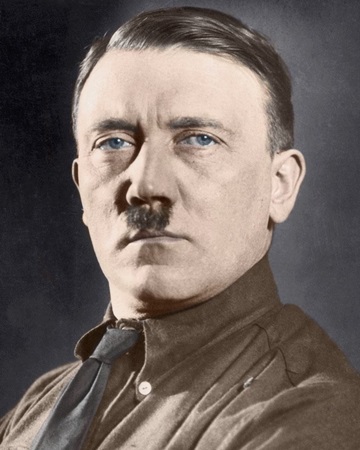MEIN KAMPF by
Adolf Hitler 41st Edition 1933
Verlag Franz Eher Nachf. G.M.B.H. Muenchen [Page 89, line 28]
Even here, majority can never replace the man * * *
[Page 92, line 22]
* * * that the political understanding of the masses is not
sufficiently developed to produce independently specific political convictions and to select the persons coming into question.
[Page 378, line 13]
The young movement in essence and structure is anti-parliamentarian, i.e., it rejects a principle of majority voting in general as well as in its own organization * * *.
[Page' 379, line 24]
* * * and even its participation in the activities of a parliament has only the purpose to contribute to its destruction, to the elimination of an institution which we consider as one of the gravest symptoms of decay of mankind.
[Page 503, line 4]
Such a revolution can and will only be achieved by a movement which itself is already organized in the spirit of such ideas and thus in itself already bears the coming state. Therefore, the national socialist movement may today become imbued with these ideas and put them into practice in its own organization so that it not only may direct the state according to the same principles, but also may be in a position to put at the state's disposal the finished organizational structure of its own state.
[Page 648, line 9]
National socialism, as a matter of principle, must claim the right to enforce its doctrines, without regard to present federal boundaries, upon the entire. German nation and to educate it in its ideas and its thinking * * *. '
[Page 648, line 21]
The national socialist doctrine is not the servant of political interests of individual federal states, but shall become the ruler of the German nation.
549
Extracts from Mein Kampf, on the Nazi party's anti-parliamentary character and the aim to reshape the government and nation on the model embodied by the party
Authors
Adolf Hitler (Fuehrer, Reich Chancellor, Supeme Commander of Wehrmacht)
Adolf Hitler
Austrian nationalized German politician, leader of the National Socialist party and dictator of Germany (1889-1945)

- Born: 1889-01-01 1889-04-20 (Braunau am Inn) (country: Austria-Hungary; located in the administrative territorial entity: Archduchy of Austria above the Enns; statement is subject of: Adolf-Hitler-Geburtshaus)
- Died: 1945-04-30 (Berlin Führerbunker) (country: Nazi Germany; located in the administrative territorial entity: Berlin; statement is subject of: death of Adolf Hitler)
- Country of citizenship: Cisleithania (period: 1889-04-20 through 1918-11-11); First Republic of Austria (period: 1919-01-01 through 1925-04-30); Nazi Germany (end cause: death of Adolf Hitler; period: 1933-01-30 through 1945-04-30); Republic of German-Austria (period: 1918-01-01 through 1919-01-01)
- Occupation: painter (statement is subject of: paintings by Adolf Hitler); political writer; politician (reason for preferred rank: generally used form); soldier
- Member of political party: German Workers' Party (period: 1919-09-12 through 1921-07-11); Nazi Party (series ordinal: 556)
- Member of: Nazi Party
- Participant in: Aktion T4; Beer Hall Putsch; The Holocaust; ethnic cleansing
- Significant person: Albert Speer; Benito Mussolini; Eva Braun; Joseph Stalin
Date: 1933
Literal Title: Mein Kampf by Adolf Hitler 41st Edition 1933
Total Pages: 1
Language of Text: English
Source of Text: Nazi conspiracy and aggression (Office of United States Chief of Counsel for Prosecution of Axis Criminality. Washington, D.C. : U.S. Government Printing Office, 1946.)
Evidence Code: PS-2883
Citation: IMT (page 255)
HLSL Item No.: 450255